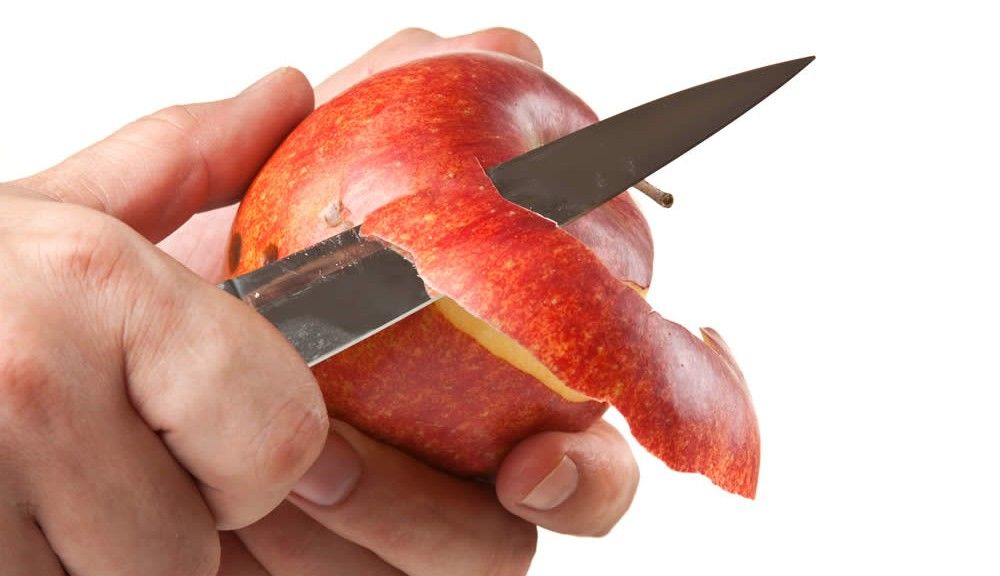
Previous
Supporting Metabolism to Help Liver-Related Fatigue

Next
Liver Health May Be Reflected in the Fingernails
Keep Your Liver Lean with Apple Skin
An apple a day could help prevent fatty liver disease, as long as you don’t peel off the skin!
For both beauty and health reasons, the majority of us aspire to be fit and slim. Currently, no safe drug exists to help transform someone into a healthy, lean individual. Thus, we are continually seeking natural, safe substances capable of cleaving excessive fat off our bodies – and our internal organs. Recently, a study from the University of Iowa has reported that something as common as an apple peel could contribute to obesity reduction and a decrease in fatty liver disease.
Due to widespread health education efforts, we perceive the cardiovascular system as the primary benefactor of losing excessive body fat. A reduced risk of atherosclerosis, lowered blood pressure and a reduction in coronary artery disease risk are tremendous advantages to becoming fit; however, a trim liver is also a major motivation for losing excessive weight.
About a Fatty Liver
An estimated 15 million Americans have a fatty liver due to alcohol use or abuse, while about one quarter of the adult population has non-alcoholic fatty liver disease. Both types of fatty liver disease are potentially serious problems. While some amount of fat in the liver is okay, more than 10 percent is indicative of a fatty liver. If not detected early and managed diligently, fatty liver disease can progress to cirrhosis, liver cancer and liver failure.
Even though it often coincides with obesity, high cholesterol, diabetes or insulin resistance (pre-diabetes), non-alcoholic fatty liver disease does not have a singular, known etiology. There is currently no specific treatment for fatty liver disease, but alcohol abstinence and moderate weight loss through diet and exercise have been shown to be the most effective ways to protect against and even reverse this liver disease.
Apple Peel Research
Because obesity and its associated problems (like diabetes and fatty liver disease) are increasingly common, University of Iowa researchers looked to produce for a solution. They found that a natural substance found in apple peel, ursolic acid, partially protects mice from obesity, pre-diabetes and fatty liver disease.
In the study led by Christopher Adams, researchers found that ursolic acid increased muscle and brown fat in mice. Brown fat is a type of fat usually abundant in newborns that helps retain body heat by burning calories. As people age, the body becomes more adept at regulating temperature, so brown fat stores shrink and white fat starts to emerge. Since leaner people tend to have more brown fat deposits than overweight or obese individuals, some scientists believe that activating brown fat could be helpful for weight loss. However, those with the most active brown fat are not necessarily healthy, as those with certain types of cancer and hyperthyroidism appear to be in this category. Nonetheless, a great deal of focus is being directed at the role brown fat deposits have in lean individuals.
In the Iowa study, the researchers studied mice likely to develop obesity, diabetes and fatty liver disease:
• They put the mice on a high-fat diet, with half of the animals receiving ursolic acid with their food.
• The mice given ursolic acid actually ate more than those not getting the supplement, and both groups had the same amount of activity.
• The mice eating ursolic acid gained less weight and their blood sugar levels remained normal.
• Ursolic acid boosted the animals’ skeletal muscle, increased their strength and endurance and resulted in higher levels of brown fat.
• Ursolic acid-treated mice failed to develop obesity-related fatty liver disease.
Due to its capacity to protect against the development or advancement of fatty liver disease, ursolic acid in apple peel will soon be evaluated in people. Besides the peels of apples, ursolic acid can also be found in cranberries, prunes, lavender, basil, oregano, rosemary and thyme.
Munching on fruit to help achieve a lean body sounds like a good idea, but this study moves apples up to the top of a liver-friendly shopping list. There is still a long way to go before advising people to eat several apples (including their skin) each day to protect against non-alcoholic fatty liver disease. However, the idea that ursolic acid could increase muscle and brown fat makes it the perfect snack in any healthful weight loss program.
http://now.uiowa.edu/2012/06/peels-show-more-promise, Peels Show More Promise, Jennifer Brown, Retrieved July 13, 2012, The University of Iowa, 2012.
http://www.isciencetimes.com/articles/3263/20120621/calorie-burning-compound-apple-peel-reduces-obesity.htm, Calorie Burning Compound in Apple Peel Reduces Obesity in Mice, Chelsea Whyte, Retrieved July 13, 2012, iScience Times, 2012.
http://www.liversupport.com/wordpress/2012/04/good-reason-to-thwart-fatty-liver-disease/, Good Reason to Thwart Fatty Liver Disease, Nicole Cutler, L.Ac., Retrieved July 15, 2012, Natural Wellness, 2012.
http://www.plosone.org/article/info%3Adoi%2F10.1371%2Fjournal.pone.0039332, Ursolic Acid Increases Skeletal Muscle and Brown Fat and Decreases Diet-Induced Obesity, Glucose Intolerance and Fatty Liver Disease, Steven D. Kunkel, et al, Retrieved July 13, 2012, Kunkel et al, 2012.
http://www.time.com/time/health/article/0,8599,1890175,00.html, Brown Fat: A Fat that Helps You Lose Weight?, Alice Park, Retrieved July 15, 2012, Time, Inc., 2012.
http://www.webmd.com/hepatitis/fatty-liver-disease, Fatty Liver Disease, Retrieved July 15, 2012, WebMD, LLC, 2012.






